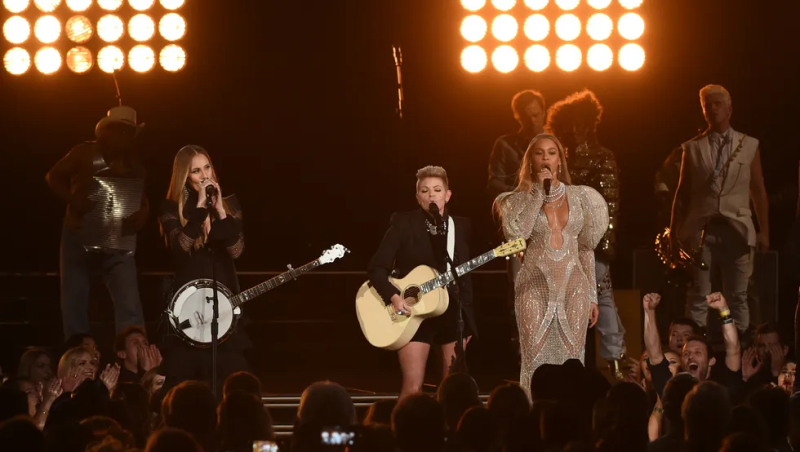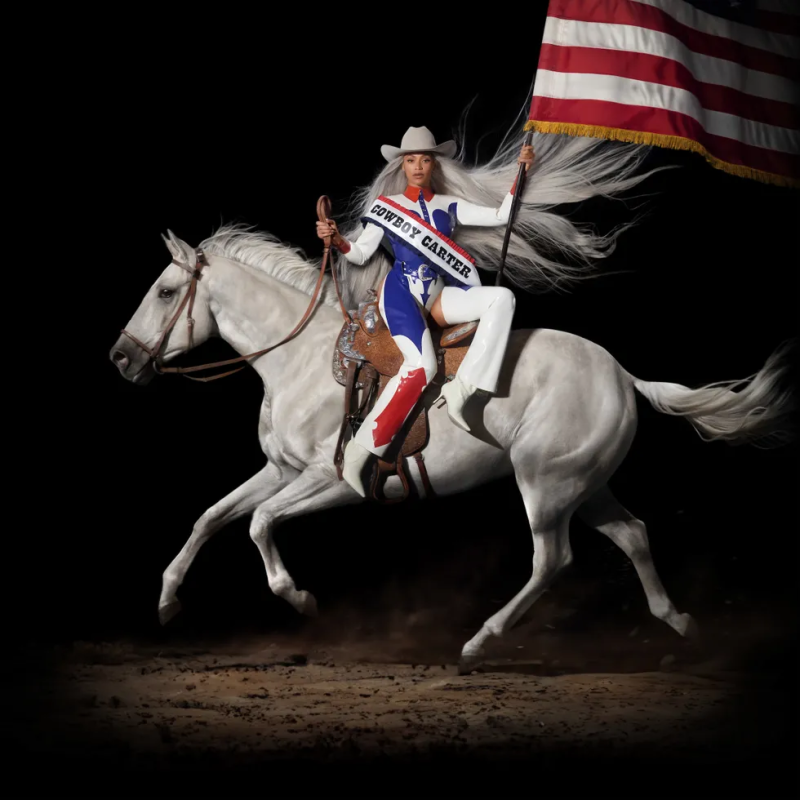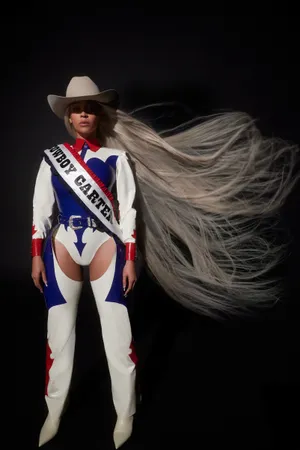The Age of the Rhinestone Cowgirl: How Beyoncé brings glitz to the Wild Wild West
Cowboy hats are everywhere right now. You see them on artsy posters in college rooms. They're a bachelorette must-have. And, perhaps most importantly, a cowboy hat sits atop Beyoncé's blond tresses on the cover of her latest album "Cowboy Carter."
A harbinger of something bigger, the hat signifies a cultural reckoning disguising itself as a fashion moment. Don't look now, but the cowgirl is remaking herself.
This "new" Western chic is not exactly Jessie from "Toy Story." Instead, it’s fiercely feminine, heavily accessorized, and dipped in glitz. A Rhinestone Cowgirl™, if you will. While Beyoncé's latest work certainly punctuates it, the aesthetic has been steadily gaining traction for over half a decade.
In January 2018, the same year Lil Nas X rode "Old Town Road" to the top of the charts, British Vogue ran a story with the subhead “Less Rodeo Cowboy, More Rodeo Drive.” It was that same year that internet archivist Bri Malandro coined the term "Yeehaw Agenda."
Where the worn leather quality of country music’s signature cowboys (think George Strait and Willie Nelson) once contrasted against a rhinestoned flashiness in their female counterparts (think Shania Twain and Dolly Parton), the new cowgirl challenges the notion that they should be separate. It bedazzles the Stetson and makes women worthy interlocutors of the Wild Wild West.
Need a break? Play the USA TODAY Daily Crossword Puzzle.
“Country music, so much of it has been in the gender binary – men are like this, women are like this,” Kinitra Brooks, a professor at the University of Michigan who specializes in the study of Black women, genre fiction, and popular culture said. "I think that the glitzy glam, she’s taking it and playing with it but also in some ways possibly blurring the gender lines and saying you can be both/and instead of either/or," Brooks said of Beyoncé's latest work.
While "Cowboy Carter" deals in more "classic" Western fare, its precursor "Renaissance" also featured Beyoncé atop a horse, only this time bedecked in shimmering metallics. The aesthetics, together, read as a powerful statement about who gets to assume the costumery of frontiersmen. “All these looks are very much in conversation with each other” Brooks reminds.
The Genuine Article
On a cover for W Magazine to promote the album, Knowles dawned a custom Louis Vuitton tan suit with golden brown and turquoise detailing reminiscent of Porter Wagoner. The headline read "In Beyoncé's Country, All Are Welcome." The word country does double duty here − referring not only to America but to the country music genre.
When announcing "Cowboy Carter," Beyoncé said the album was born out of an experience where she felt unwelcome (read: the 2016 CMAs when her performance of "Daddy Lessons" received backlash online.) Country music is a business notoriously hostile to outsiders, every bit as stringent about what makes for an authentic American experience as the tropes that govern its songs. But Ms. Knowles' chilly reception would be hard to blame on anything but racism given she's a Texas native, a veteran act of the Houston Rodeo, and the song she chose to perform was a toe-tapping banjo ballad built around bible-toting, gun-slinging imagery. Her bonafides were hardly counterfeit.

On "Cowboy Carter's" opening track, Knowles fires back, singing "They used to say I spoke too country\then the rejection came said I wasn't country 'nuff\said I wouldn't saddle up\If that ain't country tell me what is\plant my bare feet on solid ground for years."
That Beyoncé is the genuine article, a maverick and a frontiersman, a daughter of the American South and a certified rodeo queen invites an authenticity that has long lay at the center of the debate over Western iconography. Fans aren't "dressing up" as John Wayne when they don the Stetson, they're dressing up as her − every bit a cowboy.

Only hers is a cowboy that brings to light buried truth. It pays homage to the Black cowboy, a figure largely scrubbed from popular Western lore. Smithsonian magazine reports an estimated one in four cowboys were Black and as Malandro has chronicled, the rodeo and westernwear have long been part and parcel of Black culture. “For a goodly number of Black folks in the South, this isn’t a costume – this is their everyday wear,” Brooks, who grew up in New Orleans and has childhood memories of Black cowboys in the parades, says.
"There hasn’t been ever in the history of mainstream country music a record that dominates the narrative that comes from a feminized, marginalized and radical position," Marcus Dowling, a country music reporter at The Tennessean, part of the USA TODAY network told the New York Times' Popcast. Perched atop Beyoncé's head, the cowboy hat screams of a new chapter. The American Requiem (track one on the album) vibrates not only in the music but in the symbolism. "Them old ideas, yeah, are buried here, yeah" she croons as if willing her audience to stretch their imaginations wider. Any and all can sidle up to the saloon counter, push forward an empty glass and demand to be served.
Beyoncé's opus and its accompanying artwork do not mimic, they reinvent. They take the twine of what came before and rework it in new hands, warming it to a modern world and making of it a brand new symbol− Cowboy Carter: lone ranger, siren for the American story.
Rhinestoned Cowgirl™
"When you think about the cowboy aesthetic it was really historically associated with men," Dayna Isom Johnson, a trend expert for Etsy said, "so now this is a style that is being embraced by all in their own unique way and really kind of blurring those traditional lines."
That blurring gestures at a larger thesis behind the aesthetics: for all that the cowboy is in modern lore: a renegade, a boundary-breaker, a certified main character − a woman can be that too.
“She is assuming the camouflage of the guys.” Vanessa Friedman, the New York Times' chief fashion critic wrote recently, pointing out Knowles' western ode doesn’t exactly lean into prairie skirts. She keeps the chaps and ten-gallon hats but is sure to add a certain pageantry −booty shorts with a bolo tie for example, or rhinestone-encrusted leather pants. She's conjuring the image of the masculine cowboy, then painting herself within its outline with just enough flourish to assert that embodying the spirit of such a figure does not require shirking your feminized markers.
“That’s the beauty of Beyoncé right, we all know and love her for her pop star glam and now that she is merging into this new western-themed look you kind of have the best of both worlds,” Isom Johnson says. The products flying off Etsy's virtual shelves demonstrate that marriage, she reports. Metallic threading through a suede jacket, for example, or a cowboy hat with rhinestone embellishments.
“Cultural icons like Beyoncé, she kind of sets the bar for what people are going to be inspired by and there’s so many different ways that that can be translated,” Isom Johnson said. In the first 3 months of 2024 compared to last year there was a 428% increase in searches for horseshoe charms on Etsy and a 124% increase for cowboy boots, she reports.
E-commerce accelerator Pattern previously shared with USA TODAY that in the weeks following the album release, there was an 86% increase in demand for black cowboy hats and a 38% increase for bolo ties.
American Requiem: For love of country
Expanding the Stetson's brim so more can find a home underneath it is no small project − and it starts with the music. To do it Beyoncé enlists prophets of country's past and frontierswomen of its future.
“I think because she’s Beyoncé there can be some disregard for her being a true student of music and it’s so clear that she does her research,” Brooks said. The album features a cover of Dolly Parton's "Jolene," reworked from "please don't take my man" to "take my man, I dare you." It also traffics in plenty of the genre's signature tropes: the scorned, maybe murderous lover in "Daughter," and the lonesome blues in "16 Carriages."
Use of the American Flag is another key choice Beyoncé makes on "Cowboy Carter." She holds a flag on the cover and is draped in its colors. On "Ya Ya," a mid-album boot-stomper, she sings "My family lived and died in America\Good ol' USA\whole lotta red in that white and blue\history can't be erased."

If the greatest act of love is honesty, the entire work − music and imagery, is about love of country.
"I think she’s saying in a way that I’m American too, I’m country too and if you can’t acknowledge this America will die. A requiem is a funeral,” Brooks says, referring to the album's opening track.
“She is speaking for those who have come before, speaking for the ancestors, speaking as an inheritor of the traditions that came before her and is saying that it is open to me as well. And if America is unable to deal with these sort of multiplicities it will die,” Brooks said.
Disclaimer: The copyright of this article belongs to the original author. Reposting this article is solely for the purpose of information dissemination and does not constitute any investment advice. If there is any infringement, please contact us immediately. We will make corrections or deletions as necessary. Thank you.







